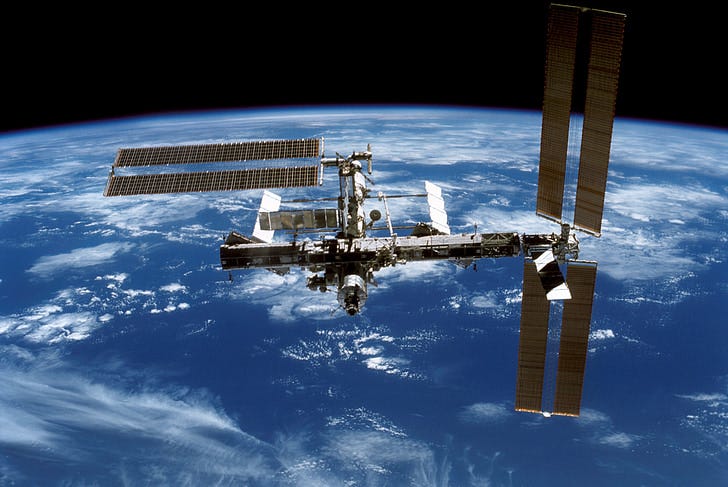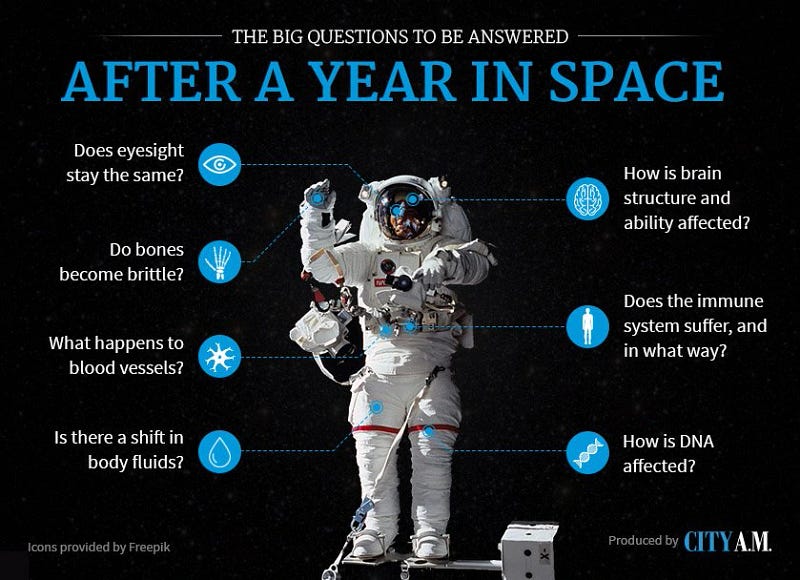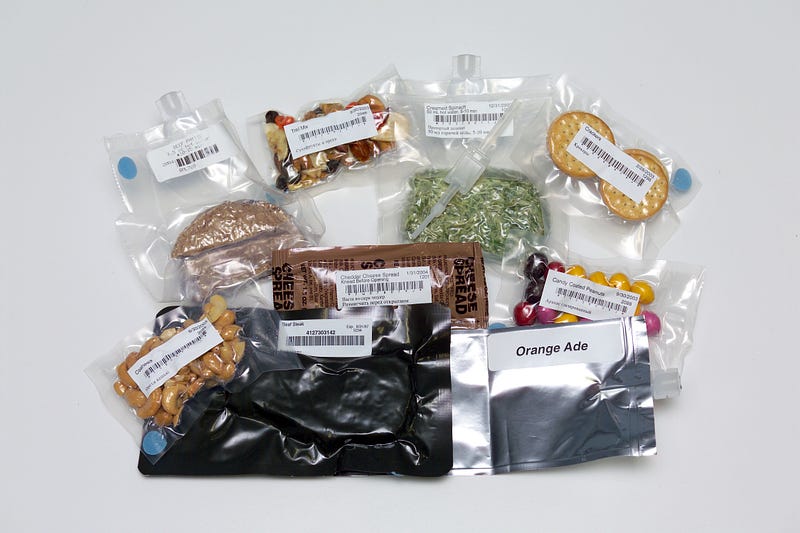Exploring the Impact of Microbiota on Astronaut Health in Space
Written on
Chapter 1: The Toll of Space Travel on Health
Embarking on long journeys, especially to destinations like Mars or the Moon, can significantly impact both physical and mental health. While movies portray space travel as exhilarating, the reality is often grueling and far from enjoyable.
The stressors of space travel pose serious challenges to astronaut health. NASA identifies five primary risks associated with human spaceflight: radiation exposure, altered gravity, the vast distance from Earth, confined living conditions, and isolation. Spending time in a low-gravity environment can lead to notable changes in the body, such as weakened bones and diminished taste perception. These stressors have been shown to affect gut microbiota, posing a potential risk to astronaut well-being, particularly during extended missions.
Gut Microbial Dysbiosis and Its Implications
The microorganisms residing in our gut and their byproducts play a crucial role in maintaining health and well-being. They not only educate our immune system but also influence disease severity, treatment responses, and emotional health. Various environmental stressors can disrupt the delicate balance of gut microbiota, a condition termed dysbiosis.
In the microgravity of space, astronauts often experience nausea and reduced appetite, which can disturb their gut microbiome. This disruption can lead to malnutrition, increasing susceptibility to infections and reducing immune defenses, along with potential negative effects on psychological and cognitive functions.
During extended missions, astronauts may face a range of health issues, including gastrointestinal problems, respiratory illnesses, skin irritations, and mental health challenges such as anxiety and depression. These issues often correlate with dysbiosis, weakened immune responses, and heightened inflammation.

Addressing Space Travel's Unique Challenges
The situation becomes particularly uncomfortable when considering the logistics of waste management in space. NASA has evolved from using rudimentary systems like plastic bags during the Apollo missions to more sophisticated methods on the International Space Station (ISS), where waste is suctioned into containers and incinerated upon re-entry.
Research has increasingly focused on the dysbiosis of astronaut microbiota and its health implications. Studies indicate that microgravity can induce significant changes in both beneficial and harmful bacteria. For instance, samples taken from astronauts before and after missions have shown shifts in the microbiota of the mouth, nose, and gut.
Recent studies involving astronauts who spent six to twelve months aboard the ISS confirmed significant alterations in their microbiomes. Notably, the diversity of gut microbiota became more uniform among crew members, with a decline in anti-inflammatory bacterial groups, coinciding with increased inflammatory markers.

Dysbiosis Specifics: What We Know
Among the changes observed, key bacterial groups showed substantial reductions during spaceflight:
- A significant decline in Akkermansia and Ruminococcus, with a notable drop in Pseudobutyrivibrio and Fusicatenibacter.
- The skin microbiome demonstrated a decrease in Gram-negative Proteobacteria, while an increase in Firmicutes and Actinobacteria was noted.
- Nasal microbiota changes were milder but indicated similar trends.
While the exact risks posed by these changes remain unclear, certain bacterial increases—such as those associated with intestinal inflammation—merit further investigation to understand their implications for astronaut health.
Genetic Alterations from Space Travel
The NASA Twins Study revealed that long-term space missions could result in lasting changes to gene expression. Scott Kelly, who spent a year in space, exhibited changes in about 9% of his genes, with most reverting after his return. This study highlighted the influence of space travel on DNA damage responses, immune function, and cognitive abilities, though his overall mental performance remained stable during the mission.

Nutritional Strategies for Astronauts
The dietary needs of astronauts are unique; their food must be lightweight, nutritious, and non-perishable. With a daily caloric intake of over 2500 calories, the menu is carefully curated for nutritional value and compatibility with space travel.
Food preservation methods, such as freeze-drying, ensure that astronauts have access to wholesome meals while avoiding spoilage. Different preparation methods are employed depending on the food type, requiring careful management to maintain quality in the absence of refrigeration.
Research continues into the use of prebiotics and probiotics to support astronaut health. However, many challenges remain regarding their efficacy in microgravity and the best delivery methods for effective results.

Considerations for Future Missions
Understanding the effects of space travel on gut health is essential for future missions, especially considering the different responses of men and women to microgravity.
In conclusion, while astronauts face significant limitations in their dietary choices during missions, those of us on Earth enjoy the privilege of diverse and nutritious food options. As astronauts strive to regain their health upon returning to Earth, we must appreciate the importance of maintaining our gut health.
For further insights into gut health and nutrition, feel free to explore my article below:
Feed, Fix and Flourish Your Microbiota for Healthy Gut and Happy You
A road towards immune fitness with a functional diet — prebiotic, probiotic, and synbiotic.
This video discusses the NASA Twins Study, which highlights how spaceflight can affect gut bacteria and overall health.
This video explores the microbial experiences of astronauts during spaceflight and the implications for their health.